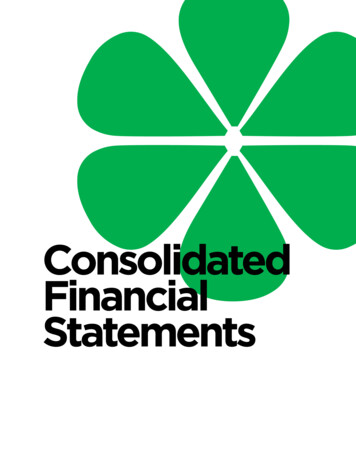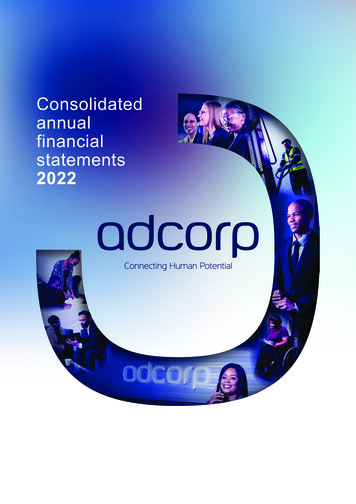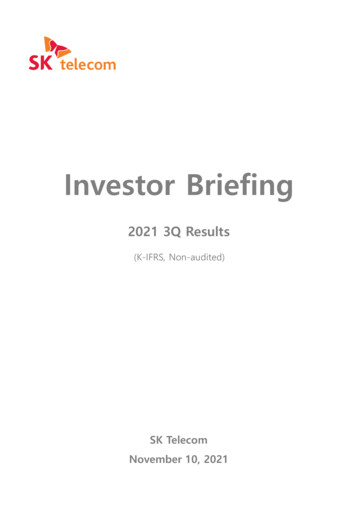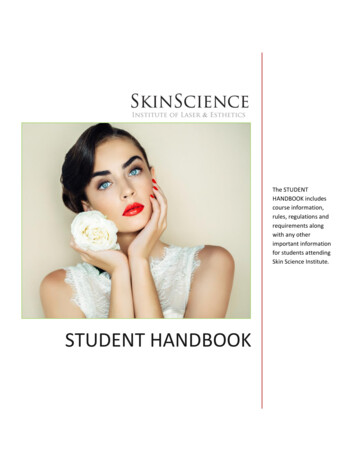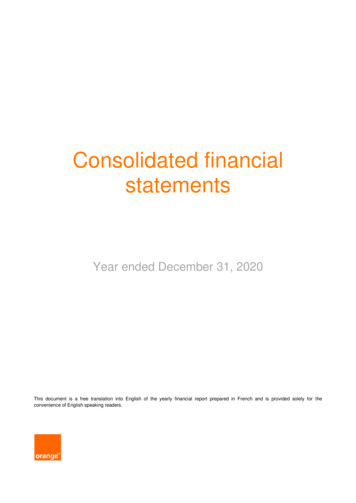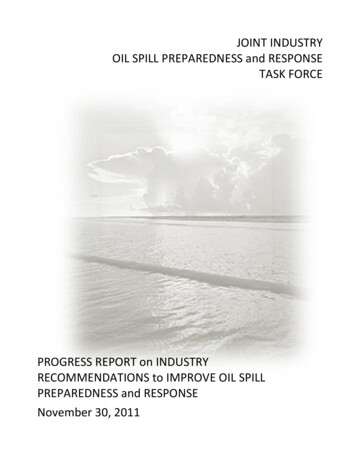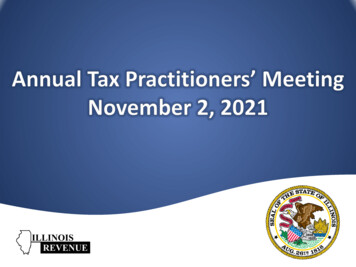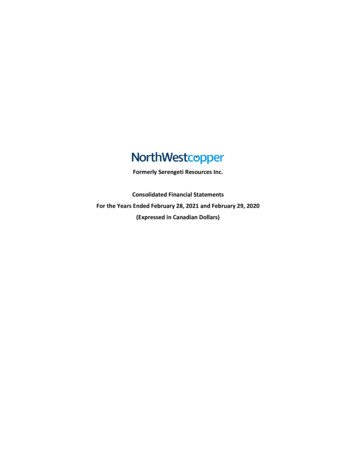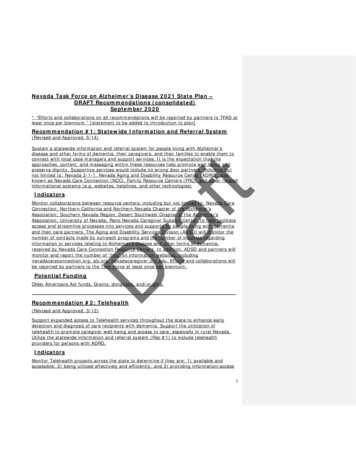
Transcription
Nevada Task Force on Alzheimer’s Disease 2021 State Plan –DRAFT Recommendations (consolidated)September 2020* “Efforts and collaborations on all recommendations will be reported by partners to TFAD atleast once per biennium.” [statement to be added to introduction to plan]Recommendation #1: Statewide Information and Referral System(Revised and Approved, 5/14)IndicatorsraftSustain a statewide information and referral system for people living with Alzheimer'sdisease and other forms of dementia, their caregivers, and their families to enable them toconnect with local case managers and support services. It is the expectation that theapproaches, content, and messaging within these resources help promote well-being andpreserve dignity. Supportive services would include no wrong door partners, including butnot limited to: Nevada 2-1-1, Nevada Aging and Disability Resource Center (ADRC), alsoknown as Nevada Care Connection (NCC), Family Resource Centers (FRC), and other relatedinformational systems (e.g. websites, helplines, and other technologies)DMonitor collaborations between resource centers, including but not limited to: Nevada CareConnection; Northern California and Northern Nevada Chapter of the Alzheimer'sAssociation; Southern Nevada Region, Desert Southwest Chapter of the Alzheimer'sAssociation; University of Nevada, Reno Nevada Caregiver Support Center, to help facilitateaccess and streamline processes into services and supports for people living with dementiaand their care partners. The Aging and Disability Services Division (ADSD) will monitor thenumber of contacts made by outreach programs and the number of inquiries regardinginformation or services relating to Alzheimer’s disease and other forms of dementia,received by Nevada Care Connection Resource Centers. In addition, ADSD and partners willmonitor and report the number of “hits” on information websites, includingnevadacareconnection.org, alz.org, nevadacaregiver.unr.edu. Efforts and collaborations willbe reported by partners to the Task Force at least once per biennium.Potential FundingOlder Americans Act funds. Grants, donations, and/or gifts.Recommendation #2: Telehealth(Revised and Approved, 3/12)Support expanded access to Telehealth services throughout the state to enhance earlydetection and diagnosis of care recipients with dementia. Support the utilization oftelehealth to promote caregiver well-being and access to care, especially in rural Nevada.Utilize the statewide information and referral system (Rec #1) to include telehealthproviders for persons with ADRD,IndicatorsMonitor Telehealth projects across the state to determine if they are: 1) available andaccessible; 2) being utilized effectively and efficiently; and 3) providing information/access1
to follow-up resources. Review evaluation of programs to ensure better quality of life forpatients living with dementia and their caregivers.Commented [CD1]: Medicaid, Medicaid Managed CareOrganization and Medicare Dual Special Needs Plansutilization data reports.Potential FundingADSSP State of Nevada: ADSD through the Older Americans Act Federal Government:HRSA GWEP programs (in progress at UNR & UNLV), iHHS (Office of Science andTechnology, Assistant Secretary HHS Lance Robertson). Grants, donations, and/or gifts.Commented [CD2]: Are the GWEPs funding sources forexpanded telehealth access?i Emerging Technologies to Help Aging Americans Maintain Their Independence, Office ofScience and Technology Policy, Assistant Secretary of HHS Lance Robertson, tasked withexpanding rural broadband to ensure older Americans in all parts of the country couldbenefit from being digitally connected.Recommendation #3: Cultural Competence(Revised and Approved, 7/9)DraftTo help ensure successful processes and outcomes, advocates would benefit from engagingin non-stigmatizing sensitivity training, as well as proactive efforts to gain input from affectedcommunities. Specific activities might include, without limitation:1) Promoting Implicit Bias testing. Encourage personnel involved in public-facingengagements with the Alzheimer’s community to take Implicit Bias assessments.2) Promoting listening sessions. Before developing campaigns, entities conductingoutreach should engage Alzheimer’s community members to gauge impressions onaging services and healthcare experienced by its culturally diverse and marginalizedmembers.3) Promoting development and use of culturally- competent Toolkits as a resource to supportentities providing awareness and outreach campaigns for the Alzheimer’s community.These activities align with the understanding that person-centered care involves nonstigmatizing, customized outreach approaches to address a multicultural population (i.e.reflecting differences in ability, generation, ethnicity/race and sexual orientation/genderidentity). Adopting this approach has been shown to increase a person’s receptiveness tooutreach efforts, improve the quality of their care and minimize their experienced healthdisparities.Indicators Monitor number of created, adopted and disseminated culturally sensitive Toolkits.Monitor number of service providers that report having participated in cultural sensitivitytrainingCommented [CD3]: How will this be monitored?Potential FundingNational Resource Center on LGBT Aging; US DHHS Office of Minority HealthUS; and Nevada DHHS – Aging and Disability Services Division Collaboration with differentcultural and ethnic focused organizations Philanthropic sector; grants, donations and/or giftsRecommendation #4: Affordability (Retired to Appendix 3/12)Recommendation #5: Outreach to Physicians(Revised and Needs Vote)Continue to support collaborations between medical professionals and medical2
associations to adopt and promote use of best-practice diagnostic guidelines forAlzheimer's disease and other forms of dementia. Support a meaningful and effectivecommunication continuum between these professionals and community-based serviceorganizations, including referrals to community-based resources.Specifically, support statewide partnerships and collaborations to increase access to earlydiagnosis of Alzheimer’s and other dementias, and to expand dementia care educationacross primary care practices and health systems in Nevada. These initiatives willinclude, but are not limited to, the Geriatric Workforce Enhancement Programs (GWEPs)through the UNR and UNLV schools of medicine, the Sanford Center for Aging, ProjectECHO Nevada, the Cleveland Clinic Lou Ruvo Center for Brain Health, the UNRDementia Engagement, Education and Research (DEER) Program’s Dementia FriendlyNevada initiative, as well as the partnership between the Alzheimer’s Association andthe Nevada Division of Public and Behavioral Health.IndicatorsraftData gathered through the CDC Behavioral Risk Factor Surveillance System surveymodules on subjective cognitive decline and caregiver burden. Alzheimer’s Associationphysician referral data reports, and other data on early detection/diagnosis, asavailable. To the extent practicable, DHHS will track and report Nevada-specific datarelated to the goal established in Healthy People 2030: Improve health and quality oflife for people with dementia, including Alzheimer’s disease. In addition, theDepartment shall report data for the following Healthy People 2030 Dementia IncludingAlzheimer’s (DIA) objective:DIA-3: Increase the proportion of adults aged 45 years and older withSubjective Cognitive Decline (SCD) who have discussed their confusion ormemory loss with a health care professional.DData specific to Nevadans in the age group associated with DIA-3 is collected at leastbiannually by DHHS using the Behavioral Risk Factor Surveillance System (BRFSS) cognitivedecline module. The module is a six question survey used to determine how cognitivedecline affects individuals age 45 and older in performing activities of daily leaving includingcaring for themselves.Baseline: The most recent available BRFSS cognitive decline data for Nevada, as from 2015reported by the Alzheimer’s Association. From that survey, 16.3 percent – one in six – ofthose aged 45 and over report they are experiencing confusion or memory loss that ishappening more often or is getting worse (“subjective cognitive decline”). 49.6% of themhave not talked to a health care professional about it. For those with worsening memoryproblems, 45.1 percent say it has created “functional difficulties” – that is, caused them togive up day-to-day activities and/or interfered with work or social activities. (CognitiveDecline in Nevada: Data from the 2015 Behavioral Risk Factor Surveillance System,Alzheimer’s Association, 2016)Potential FundingFederal/state, foundation grants. Private gifts.Recommendation #6: State Match Program for APRNs(Retained and Approved, 3/12)Support the establishment of a state match program between the State'sDepartment of Health and Human Services, collaborating with the State Board ofNursing, and federal partners. This match program is intended to address the3
state's health provider shortage in rural and frontier communities. Match money,which could be offered as loans or scholarships, would be made available toAPRNs, who commit to the specified loan or scholarship terms and requiredservice provisions as they relate to providing health care services to underservedrural and frontier areas in Nevada.IndicatorsPrimary Care Workforce Development Office (DHHS), working with the State Board ofNursing, would monitor the number of APRNs serving under-served rural and frontierareas in Nevada.Potential FundingHealth Resources and Administration Grants. Other appropriations. Grants, donations,and/or gifts.Recommendation #7: Care Pathways (Retired to Appendix as Care PathwaysraftOR Revised to include focus on Research Consortium – see suggestion below?)Support the Cleveland Clinic Lou Ruvo Center for Brain Health in itsestablishment of a Nevada Consortium to promote current andfuture research in Nevada. Expand the ADRC website to specificallyinclude information on Alzheimer's research that containsinformation about current research and a registry that allowsindividuals to register to participate in clinical research.Justification: Index for future implementation. Cleveland Clinic’s status as an Alzheimer’sDisease Research Center (if granted a P20 grant) can change the scope of therecommendation as well as engagement capabilities. We will find out May 2020 whetherwe are awarded this grant.Suggested Revisions: Please provide the text for your suggestions on how to reviseDthe recommendation (and be sure to include each of the following required elements): Recommendation: To be determined.1. Model this recommendation on the Arizona Alzheimer's Consortium(AAC) the nation's leading model of statewide collaboration inAlzheimer's disease research. Established in 1998, the Consortiumcapitalizes on its participating institutions' complementary strengths inbrain imaging computer science, genomics, the basic and cognitiveneurosciences and clinical and neuropathology research to promote thescientific understanding and early detection of Alzheimer's disease andfind effective disease-stopping and prevention therapies. It also seeks toeducate Arizona residents about Alzheimer's disease, research progressin the state and the resources needed to help patients, families andprofessionals manage the disease. The Consortium is determined to findeffective treatments to halt the progression and prevent the onset ofAlzheimer's disease in the next 12 years. Members include ASU, Banner4
Alzheimer’s Institute, Banner Sun Health, Barrow Neurological Institute,Dignity Health, Mayo, tgen, UofA. Website: http://azalz.org/2. Remove the Nevada Research Consortium site from ADRC website to anindependent website to promote its own identity and authority.Recommendation #8: Long-term Care(Retained and Approved, 5/14)Continue to review current funding and funding streams to support the developmentof quality long-term care options for people living with Alzheimer's disease and otherforms of dementia in Nevada. Provide funding or incentives to encourage long-termcare providers to increase capacity for placement of individuals with Alzheimer'sdisease and other forms of dementia. Also emphasize person-centered planning thathelps promote well-being and preserves dignity, as well as helping residents, theirfamilies, and caregivers, feel and experience respect, dignity, support, value, andinclusion in everyday community life.Commented [CD4]: Refer to Alzheimer’s AssociationLong-term Care Practice Recommdations.raftIndicatorsMonitor the number of long-term care options for persons with Alzheimer'sdisease and other forms of dementia across the state, as well as success of longterm care dementia training programs such as the Nevada Department ofVeterans Services Bravo Zulu program, and others as appropriate.Potential FundingMedicaid expansion through Home- and Community-Based Services Waiver. Expansionthrough the DHHS Behavioral Rate for skilled nursing facilities. Increased supplementalSSI rate. Tax incentives. Grants, donations, and/or gifts.Recommendation #9: Caregiver Support(Revised and Needs Vote)DProvide caregivers with information about and access to evidence-based/informededucation, support services, and resources to: 1) promote knowledge and understanding ofAlzheimer's disease and other forms for dementia to best support people living withdementia, 2) provide and expand respite services for family and informal caregivers ofpersons with dementia, and 3) enhance caregiver well-being. These services include, butare not limited to, family care consultations, solution-focused caregiver support groups,educational programs and services, respite programming, and evidence-based programs asincluded in the Nevada Dementia Supports Toolbox. Support efforts to promote and fundcomprehensive caregiver education and services that are provided by many organizations,including, but not limited to: AARP, Alzheimer's Association, Catholic Charities, theCleveland Clinic Lou Ruvo Center for Brain Health, UNR DEER Program, Nevada Departmentof Veterans Services, Nevada Senior Services, UNR Nevada Caregiver Support Center andUNR Sanford Center for Aging. Broaden the eligibility requirements for programs and grant funding so that more familiesmay benefit from them regardless of financial status or age. Support the Nevada Dementia Friendly initiative and the work of the state's DementiaFriendly Community Action Groups throughout Nevada. Improve access to support services and programs by sustaining a statewide information5
and referral system (recommendation #1) for families, caregivers, and individuals withAlzheimer's disease and other forms of dementia.IndicatorsAging and Disability Services Division (ADSD) will track and compile data it collects fromADSD funded programs. ADSD will annually monitor program availability, waitlists, numberof consumers/clients served, and hours of caregiver support services provided throughADSD- funded programs. Key partners and other dementia-related organizations that areworking in alignment to support these efforts will also be asked to report on service deliveryand outcomes from caregiver support programs.Potential FundingFund for a Healthy Nevada. Retired and Senior Volunteer Group (RSVP). Older AmericansAct Funding. The Alzheimer's Association. Grants, donations, and/or gifts. Explore additionalfunding opportunities to support caregiver programs once existing funds expire.raftRecommendation #10: Dementia Training(Retained and Approved, 5/14)TFAD encourages the State of Nevada to identify, adopt, and/or develop, aconsistent, high quality, comprehensive dementia training program that aligns withNRS 449.094 requirements and current national practice recommendations. Thisprogram must be made available to all nursing homes through leveraging keypartners to encourage and implement the program, including program delivery andevaluation.IndicatorsDA high-quality, comprehensive dementia training program is identified or developedand made available to all nursing homes statewide. The identified or developedprogram is encouraged by key partners. The program is adopted and implementedby an increasing number of nursing homes over a three-year period.Potential FundingState appropriation and/or state grants for the proposed dementia training initiative.Grants, donations, and/or gifts.Recommendation #11: Volunteers(Revised and not Voted on)Recruit and train community volunteers through collaboration with various organizationsincluding non-profits, service organizations, health care institutions, and universities, whichhave existing programs, education, and practices that address Alzheimer’s disease andother forms of dementia. This commitment to education and outreach needs to include richand abundant Train-the-Trainer models that then permit and encourage volunteers to shareknowledge and information in communities while finding, recruiting, and training localresidents to continue to learn more about Alzheimer’s disease and other forms of dementia.6
These additional volunteers can then carry on the drive to provide new knowledge andresource tools to others. Increased outreach and personal connections will help destigmatize and reduce fear and misunderstanding associated with dementia through openconversations and reliable information. Through these collaborations, volunteers will havethe opportunity to expand their own knowledge and awareness about all the many forms ofdementia and learn how to effectively participate in the care and support of persons livingwith Alzheimer’s disease and other forms of dementia, their families, and their caregivers.This also means ongoing training and support connections for volunteers as they continue toadvance personal knowledge to better assist those living with dementia, their families, andcaregivers as well as expand community awareness about resources and support tools.In supporting age- and dementia-friendly communities, volunteers will learn how topromote each person’s well-being, as well as preserve their personal dignity and respectin everyday community life. Also, by implementing Train-the-Trainer programs, volunteeroutreach opportunities can be expanded. It is essential to de-stigmatize the idea thatvolunteers lack the knowledge and capabilities to fulfill this critical role.IndicatorsPotential FundingraftMonitor and correspond with non-profits, service organizations, healthcare institutions, anduniversities that recruit volunteers to learn the number of volunteers recruited (for thenumber of volunteers they recruit), the types of training they offer, how many volunteersthey train, and what other services are provided. Determine which additional trainings andservices might be needed to expand volunteer education and opportunities.Grants, donations, and/or giftsRecommendation #12: Guardianship(Retained and Approved, 5/14)DAwareness of Alzheimer's disease and other forms of dementia is crucial to effectiverepresentation of legal services clients. Their need to be protected from exploitationincludes, but is not limited to, such areas as: estate planning, guardianship, anddecision-making. Students entering law-related professions, including, but not limitedto, attorneys, paralegals, and related careers should be offered, through their courseof study, opportunities to learn, discuss, and consider the specifics of Alzheimer'sdisease and other forms of dementia. This includes, but is not limited to, professionalresponsibility for effective representation of clients with capacity issues and estateplanning for clients, who are at risk of exploitation, undue influence, or capacityconcerns.After completion of course study, licensed professionals are urged to pursuecontinuing legal education (CLE) in the area of Alzheimer's disease and other forms ofdementia. The State Bar of Nevada (the licensing entity for Nevada attorneys), theBoard of Continuing Legal Education, as well as trade associations, such as theWashoe County Bar and Clark County Bar Associations, are encouraged to promoteawareness and education related to Alzheimer's disease and other forms of dementia.These CLE programs would provide legal professionals with ongoing education aboutrecent developments, research, and treatments about Alzheimer's disease and otherforms of dementia, including, but not limited to, application to issues of7
independence, decision making, and advanced care planning. Further, TFAD supportsthe offering of CLE credits for dementia-related, medically-based courses for legalprofessionals that could satisfy ethics credits for these licensed professionals.IndicatorsIncreased number of quality educational oppo1tunities, both pre- and postprofessional education or training, which are offered in schools of post-secondaryeducation and increased number of students who complete this coursework. Syllabusor other information related to topics covered at UNLV's William S. Boyd School ofLaw related to encouraged topics of concern. Continuing Legal Education offerings inthe topic area, as well as statistics of professionals, who have taken such training tocomplete requirements or to advance ongoing education. Determine number ofcourses offered to interested stakeholders by qualified members of the legal community.Potential FundingraftState appropriations to higher education. Funding from providers and/or stateagencies. Grants, donations, and/or gifts.Recommendation #13: Hospital Transitional Care Practices(Revised and Needs Vote)DEnsure high quality hospital-to-community (i.e., home and long-term care) caretransitions programs are available to persons living with dementia and theircaregivers upon hospital discharge, with key elements including: care/dischargeplanning, care management, information on community resources, wrap-aroundservices and period follow-up check-ins and assessments. One such program specificto Alzheimer’s and dementia currently available in Southern Nevada is Nevada SeniorServices’ Hospital-to-Home program. Another relevant resource is the CommunityParamedics program (active in Humboldt County). To explore new innovations, as wellas expand and support existing efforts, TFAD and ADSD should investigate federalfunding opportunities through the Centers for Medicare and Medicaid Services and theCMS Innovation Center. Opportunities to support more widespread use of a caretransitions programs should be explored by seeking and establishing key partnershipsand identifying available resources.Indicators Monitor the number of care transitions programs available across Nevada’scounties, including those connected to rural hospitals, such as the CommunityParamedics program.Monitor the ongoing process and impact data of the Hospital-to-Home program,with updates from Nevada Senior Services.Potential FundingCollaboration between Nevada ADSD, Nevada Division of Health Care Financing andPolicy (DHCFP), Division of Public and Behavioral Health (DPBH), and otherappropriate State agencies. Federal innovations and funding opportunities. Grants,donations, and/or gifts.8
Recommendation #14: Veterans and Families(Revised and Needs Vote)Support the continuation of the Veterans in Care (VIC) initiative of theNevada Department of Veterans Services, created to serve, honor andsupport the 300,000 veterans living in Nevada. In particular, emphasizeTFAD’s support for the specific VIC elements relating to veterans living withdementia and their families, including the ongoing implementation of theBravo Zulu: Achieving Excellence in Relationship-Centered Dementia Careprogram for professional and family caregivers. Further, promote thecontinued viability and quality of care being offered by Nevada’s twoveterans’ homes, both in Northern Nevada and Southern Nevada.IndicatorsMonitor the implementation of the VIC initiative, Bravo Zulu and the services beingoffered by Nevada’s Veterans’ Homes.Potential FundingraftNevada Department of Veteran Services. Federal sources. Grants,donations, and/or gifts.Recommendation #15: Driving and Dementia(No Action Yet Taken) – Moved by Woodhouse to retain, need vote.Support the standardization of the system of driver evaluation. Improve theinfrastructure, services, and support for persons with dementia whose driving abilitymay be compromised. This includes developing and implementing: 1) a uniform setof evidence-based screening tools for healthcare providers, first responders, andcaregivers and 2) a standardized evidence-based evaluation tool for use by theDepartment of Motor Vehicles (DMV).DSupport the dissemination of information regarding driving safety and dementia. Thisinformation should convey how to address the multi-faceted needs and concerns ofpersons with dementia and those who care for them. Specific information shouldinclude signs that an individual's driving ability might be compromised and how toaccess relevant resources to address this concern. Such information should beavailable on websites, as well as be distributed in printed materials to health careand social service providers, first responders, families, caregivers, and the generalpublic. Engage healthcare providers and first responders to evaluate the utility of therecommended screening tools.Promote age- and dementia-friendly communities, which provide alternativetransportation resources, through volunteerism and public-private partnerships, tomaximize an individual's independence and assure public safety.IndicatorsDMV, partnering with other agencies and organizations, will monitor input fromhealth care providers and first responders about the utility of recommendedscreening tools. DMV will monitor the number of accidents and fatalities and collectdata on: the age of drivers; the number of referrals by health care providers, firstresponders, and caregivers to the DMV; and the number of evaluations conducted bythe DMV following referral. DHHS will facilitate the distribution of informational9
materials related to driving and dementia and how the distribution of information canbe expanded and/or improved. DHHS will monitor the number and usage ofalternative transportation resources and provide this data to TFAD.Potential FundingFederal funding. DMV. Nevada Department of Transportation (NDOT). RegionalTransportation Commission (RTC). ADSD grants. Grants, donations, and/or gifts.Recommendation #16: Community Outreach(Revised and Needs Vote)raftPromote Dementia Friendly community awareness programs which are designed to increaseknowledge, understanding and access to dementia-related information and supportiveresources. Awareness programs serve to reduce stigma around a diagnosis of dementia,engage care partners and offer support to individuals living with dementia over the courseof their illness. These programs should also provide information to enable those affected bydementia to become partners in the search for effective therapies through participation inresearch, evidence-based interventions, and clinical trials.Commented [CD5]: We should consider removing thereferences to Dementia Friends and Dementia FriendlyCommunity Awareness Training; or add Alzheimer’sAssociation programs such as Healthy Living the Your Brainand Body, Understanding Alzheimer’s and Dementia, theTen Warning Signs.Dementia Friendly community awareness programs may include but are not limited to:Da) Initiatives to promote brain health for all individuals and reduce risks associated withmodifiable lifestyle factorsb) Overview of dementia including types, early symptoms, diagnosis, treatment and courseof illnessc) Community resources, educational programs and social services including evidencebased programs to support for individuals living with dementia and care partnersd) Highlight opportunities for individuals living with dementia to advocate for their wellbeing and participate in meaningful engagement in community lifee) Educational resources to increase awareness about research opportunities and benefitsof clinical trials with special consideration for those in underserved, minoritycommunitiesThe target audience for community awareness programs includes individuals living withdementia, family care partners, professional care partners, businesses, faith-basedcommunities, first responders, government agencies, social service organizations,community groups and interested individuals. Programs promoting community awarenessare offered statewide by various organizations and groups including Dementia FriendlyNevada Community Action Groups, Alzheimer’s Association, Cleveland Clinic Lou RuvoCenter for Brain Health and UNR’s Dementia Engagement, Education and Research (DEER)Program. Public awareness presentations can also include tools developed by DementiaFriendly America (Dementia Friends) and Dementia Friendly Nevada groups such asCommunity Awareness Training (CAT) and Dementia Training for First Responders video,constructed using People First Language (a type of linguistic style which puts a personbefore a diagnosis, describing what a person ”has” rather than asserting what a person“is”.)Various outreach strategies can be used to promote these programs such asbroadcast/print interviews, articles in newspapers/magazines/websites andpostings on social media sites. The Dementia Friendly Nevada website promotescommunity awareness programs scheduled in various communities statewide and10
offered online.IndicatorsMonitor the number and types of dementia-related community awareness presentationsincluding those listed on the Dementia Friendly Nevada website and offered throughDementia Friendly Community Action Groups, Sanford Center, DEER Program, DementiaFriends, Community Awareness Training, Alzheimer’s Association and Cleveland Clinic LouRuvo Center for Brain Health.Potential FundingFederal/state grants. Foundation grants. Private gifts.Recommendation #17: Business Outreac
Review evaluation of programs to ensure better quality of life for . ECHO Nevada, the Cleveland Clinic Lou Ruvo Center for Brain Health, the UNR Dementia Engagement, Education and Research (DEER) Program's Dementia Friendly . collaborating with the State Board of Nursing, and federal partners. This match program is intended to address the .
